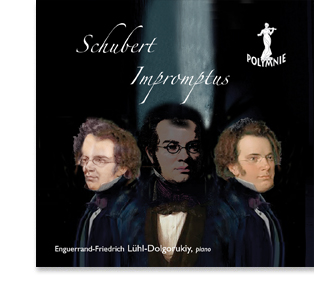 |
|||||

Franz Schubert, Impromptus
Enguerrand-Friedrich
Lühl-Dolgorukiy, piano
* Mahery
Andrianaivoravelona, piano
POL 133 154
Schubert
Impromptu n° op. 90 n° 1
Impromptu n° op. 90 n° 2
Impromptu n° op. 90 n° 3
Impromptu n° op. 90 n° 4
Impromptu n° op. 142 n°1
Impromptu n° op. 142 n°2
Impromptu n° op. 142 n°3
Impromptu n° op. 142 n°4
Lühl
Paraphrase sur une Marche militaire op. 51 *
Impromptus
Le 19ème siècle est, avec l’apparition de l’exaltation de l’égo artistique du courant romantique, sans nul doute celui des plus grandes innovations musicales de l’histoire de la musique, et ce plus spécifiquement concernant la forme dite "libre" : arabesque, bagatelle, ballade, barcarole, feuillet d’album, impromptu, intermezzo, moment musical, poème, prélude, rêverie, rhapsodie, romance sans paroles, même le terme "d’improvisation" est utilisé pour décrire une pièce de caractère narratif et descriptif depuis Schubert et Beethoven.
Les deux séries d’impromptus de Schubert (1798-1828) furent toutes deux composées un an avant sa mort prématurée ; Schubert n’ayant pas pris la peine de numéroter son catalogue impressionnant de quelque 900 œuvres de manière systématique par le terme d’opus, c’est le musicologue Deutsch qui regroupera par thème l'oeuvre du génie viennois. Ainsi, l’œuvre de Schubert porte parfois deux numérotations, le D pour Deutsch et l’abréviation op. pour opus. L'éditeur viennois Tobias Haslinger publie les deux premières pièces du cycle de l’opus 90 en décembre 1827 en leur donnant le nom d'Impromptus. N'obtenant pas le succès commercial escompté, il ne publiera les deux autres qu'en 1855, en se permettant de simplifier l’armure du troisième par une transposition en sol majeur (au lieu de sol bémol majeur essentiellement interprété sur les touches noires) et de modifier la mesure pour la rendre plus accessible au grand public !
Le caractère fort mélodique de la main droite de ces pièces a fait en sorte qu’elles furent souvent réutilisées pour des musiques de films, tant en France (Trop belle pour toi de Bertrand Blier – 1989) qu’à l’étranger (dans la série Smallville, Bienvenue à Gattaga – 1997 ou encore Equals – 2015).
Quant à l’Impromptu n°3 op.142, il est souvent surnommé Rosamunde pour la simple raison que Schubert avait déjà utilisé le thème principal dans sa musique de scène éponyme, et surtout dans le Quatuor à cordes n°13 en la mineur, D 804.
![]()
The 19th century is
undoubtedly the most innovative century regarding new musical
forms. The emerging romantic period around 1780-90, starting
with Goethe’s Sturm und Drang, first hit the German and
Austro-Hungarian Empire before quickly contaminating the rest of
Europe. Romanticism takes its roots within the exaltation of
individual feelings depicted in all forms of artwork, as opposed
to an overly rigid, standardized and ultimately outdated vision
of art in the previous century : album leaf, arabesque,
bagatelle, ballad, barcarole, impromptu, intermezzo, moment
musical, poem, prelude, rhapsody, song without words, and even
the term “improvisation” appeared as individual works slowly
filling the composers’ varied repertoire, allowing the artist to
express himself more freely without the previous constraint of
the fugue, the ricercar, the passacaglia, the minuet and other
forms from the past. The narrative and pictorial character of a
piece of music was enhanced by no others than Beethoven with his
Bagatelles and Schubert with his most famous Impromptus and
Moments musicaux.
From the two series of
Impromptus Schubert composed in 1827, one year before his death,
only op.90 #1 and 2 were published while the composer was still
alive, but they didn’t sell well and it took Schubert’s editor
Tobias Haslinger a whole generation to publish the the two
remaining pieces from the series of four. Additionally, he made
a few changes in 1855 to attract more pianists and transposed
op. 90 #3’s original key (G flat major) into G major, using less
black keys and therefore becoming more accessible for the larger
audience. Schubert’s oeuvre became increasingly popular after
his death and today, it is not surprising anymore to even hear
some of his masterpieces in film music : Bertrand Blier’s Trop
belle pour toi (1989), the series Smallville, Welcome to Gattaga
(1997) and even more recently, Equals (2015).
As for Impromptu op.142 #3, it is often nicknamed “Rosamunde”,
because Schubert reutilized the very same theme in his eponym
stage music as well as in his String Quartet #13 in a minor D
804.
![]()
Lühl-Dolgorukiy
travaille en collaboration avec les éditions phonographiques
Polymnie pour l’intégrale de l’enregistrement de ses œuvres.
Sont déjà disponibles ses quatre premiers Quatuors à cordes (POL
480 243 et POL 480 364), le
Requiem Vauban (POL 790 344), sa
cinquième Symphonie sous sa direction (POL
990 361) et de nombreux CD Rachmaninoff, dont le deuxième
Concerto pour piano op. 18 et la Rhapsodie sur un thème de
Paganini dans une réduction pour deux pianos de l’auteur (POL
150 865). Notons aussi un travail considérable
avec l'édition des oeuvres de John Williams Star Wars (POL
151 686), Harry Potter (POL
105 109), Jurassic Park (POL 108
115)... d’autres albums sont en préparation.
Lühl's recordings are available at the music label
Polymnie, for which he already recorded several works of his
own, conducting an orchestra for his Fifth Symphony (POL
990 361), or playing the piano, and more recently a CD of
piano pieces by S. Rachmaninoff and the Rhapsody on a theme by
Paganini as well as the Second piano concerto op. 18 (POL
150 865), also several CD by John Williams, Star Wars (POL
151 686), Harry Potter (POL
105 109), Jurassic Park (POL 108
115)... Lühl is planning to record his entire work (about
50 CDs).
![]()
Accueil | Catalogue
| Interprètes | Instruments
| Compositeurs | CDpac
| Stages | Contact
| Liens
• www.polymnie.net
Site officiel du Label Polymnie • © CDpac • Tous droits
réservés •



